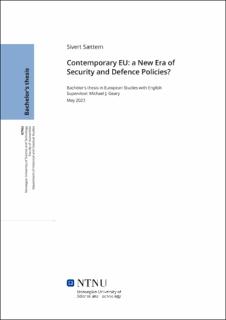| dc.contributor.advisor | Geary, Michael J. | |
| dc.contributor.author | Sættem, Sivert | |
| dc.date.accessioned | 2023-06-22T17:19:57Z | |
| dc.date.available | 2023-06-22T17:19:57Z | |
| dc.date.issued | 2023 | |
| dc.identifier | no.ntnu:inspera:145530834:29902737 | |
| dc.identifier.uri | https://hdl.handle.net/11250/3072753 | |
| dc.description.abstract | Denne tesen undersøker endringene i den offentlige diskursen rundt Europeisk Sikkerhets- of Forsvarspolitikk i Danmark og Irland, spesielt som svar på den Russiske annekteringen av Krim in 2014 og invasjonen av Ukraina i 2022. Ved å analysere Eurobarometer-undersøkelser og landrapporter, viser denne studien at mens Danmark og Irland historisk sett har vært ikke-deltakende og nøytral i sin tilnærming til europeisk forsvarspolitikk, endret holdningene deres betydelig som svar på den antatte trusselen fra de russiske handlingene.
Danmark avskaffet sitt forsvarsforbehold i 2022, mens Irland -til tross for en lang tradisjon med nøytralitet- deltok i og bidro til å etablere PESCO i 2017. Analysen antyder at selv om det var noen mindre endringer i diskursen etter annekteringen av Krim i 2014, så ble diskursen rundt europeisk sikkerhets- og forsvarspolitikk drastisk påvirket av invasjonen av Ukraina i 2022.
Studien argumenterer for at den endrede oppfatningen av trussel på det europeiske kontinentet, forårsaket av de russiske handlingene, økte støtten til et videre sikkerhets- og forsvarssamarbeid.
Artikkelen konkluderer med det har vært endringer i den offentlige diskursen om politiske posisjoner i Danmark of Irland, og at disse endringene kan ha bredere implikasjoner for fremtiden til europeisk sikkerhets- of forsvarspolitikk.
Nøkkelord: offentlig diskurs, sikkerhets- of forsvarspolitikk, ikke-deltakelse, nøytralitet, oppfatninger, forsvarssamarbeid | |
| dc.description.abstract | This thesis examines the changes in the public discourse surrounding European Security
and Defence policies in Denmark and Ireland, specifically in response the Russian
annexation of Crimea in 2014 and the invasion of Ukraine in 2022. By analysing
Eurobarometer surveys and country reports, this study demonstrates that while Denmark
and Ireland were historically non-participatory and neutral in their approach to European
defence policies, their attitudes changed significantly in response to the perceived threat
posed by the Russian actions.
Denmark cancelled its defence opt-out in 2022, while Ireland -despite a long tradition of
neutrality- participated in and helped establish PESCO in 2017. The analysis suggests
that while there were some minor changes in discourse after the annexation of Crimea in
2014, the discourse around European security and defence policies was drastically
impacted by the invasion of Ukraine in 2022.
The study argues that the changing perceptions of threat within the European continent,
brought on by the Russian actions, increased support for further security and defence
cooperation. The paper concludes that there has indeed been changes in public discourse
on policy positions in Denmark and Ireland, and that these shifts could have wider
implications for the future of European security and defence policies.
Keywords: public discourse, security and defence policies, non-participation, neutrality,
perceptions, defensive cooperation. | |
| dc.language | eng | |
| dc.publisher | NTNU | |
| dc.title | Contemporary EU: a New Era of Security and Defence Policies? | |
| dc.type | Bachelor thesis | |
